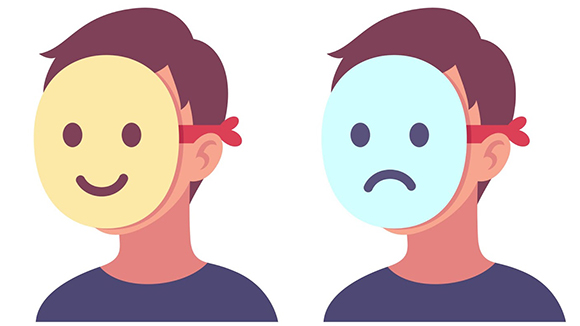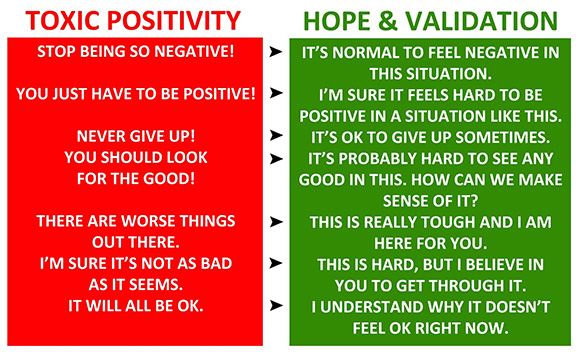Hello Coastline Students! Today we are going to talk about something that is starting to gather more and more attention on social media platforms: Toxic Positivity.

What is Toxic Positivity?
Toxic positivity is the belief that no matter how serious or difficult a situation is, one feels the need to maintain a positive mindset. It's a "Good Vibes Only" approach to life. This effect in turn causes an individual to avoid and/or ignore situations at hand which ends up hurting them more later on. All in all, toxic positivity is the excessive and ineffective belief that one needs to be in a happy, optimistic state across all situations.
Learn about Coastline's Student Mental Health Services
When does positivity become harmful to your health?
Though the concept of someone being positive is not a bad thing, it’s the belief that you should ONLY focus on the good and ignore everything that disturbs that mentality. This toxic mentality of positivity becomes harmful when it’s insincere, forceful, or delegitimizes real feelings of anxiety, fear, sadness, or hardship. In this case, it’s not healthy positivity, it’s toxic. The process of toxic positivity results in the denial, minimization, and invalidation of the authentic human emotional experience.

What does this all mean?
By ignoring the existence of certain feelings, we fall into a state of denial and repressed emotions. When in reality, humans are flawed. We all have emotions and feelings, and are expressive to a degree on how everything and anything makes us feel. It’s what makes up humans. Acceptance is key. Sometimes life is tough, but naively ignoring what is going on and believing in “positive vibes only,” does more harm. Instead of denying the validity of how you feel it’s best to take a moment and take into account how you feel, why you feel what you do, and what the next step is instead of brushing it under the rug.
Explore Psychology and other programs at Coastline
Signs of Toxic Positivity
Common signs of Toxic Positivity that result in one denying the validity of genuine human emotion include:

Suppressed Emotions
Hiding or denying feelings leads to more stress on the body and/or increased difficulty avoiding distressing thoughts and feelings).
When we don’t want to show a part of ourselves, we create a fake face or public persona for the world. This happens far too common this day in age, especially for millennials. It’s important in this day in age to not lose yourself trying to impress others. It’s okay to have days off, because sometimes the belief that “Everything happens for a reason” or “it is what it is'' does more harm than good. When we go into hiding like that, we deny our truth. The real truth is, life can hurt sometimes. If you’re angry and the angry feelings aren’t acknowledged they get buried and cause you to eventually lash out. Suppressed emotions can later manifest in anxiety, depression, or even physical illness.
Conclusion
It’s important to acknowledge the reality of our emotions by verbalizing and expressing them. This is what keeps us sane, healthy and relieves us of the tension caused by suppressing the truth. Acceptance is key, not denial. Once we honor our feelings, we embrace ALL of ourselves, the good, the bad and the ugly. And accepting ourselves just as we are is the path to a robust emotional life.

Ignoring what you are going through causes you to begin to live inauthentically. You soon begin to lose connection with yourself, making it difficult for yourself and others to understand what you are going through. Though you may have good intentions in believing in “good vibes only,” this creates a false narrative. Not being honest about your own feelings with yourself and others curates an emotional void.